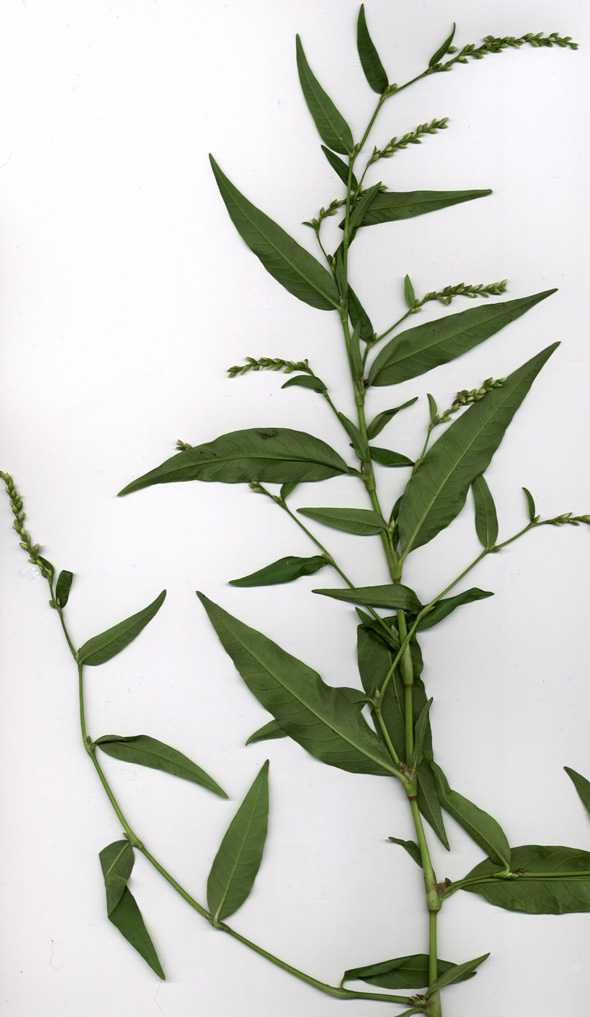Plant of the Month: October 2003
|
| Water Pepper |
Polygonum Hydropiper L.
|
= Persicaria Hydropiper (L.) Spach
|
(POLYGONACEÆ); Buckwheat Family
|
| The genus Polygonum, in broadly conceived, contains over 200 species. I have tasted at least 20 of them. Only two species tasted produced a hot peppery sensation in my mouth. Since I relish Flavor and Spicy foods, these two species please me greatly. And, one of these two being a Eurasian species now recorded as a weed in every one of the 50 United States except Arizona and New Mexico, I am happy to write about it. (The other is from Southeast Asia, Polygonum odoratum = Persicaria odorata.) |
| Water Pepper was named scientifically Polygonum Hydropiper by Linnaeus in 1753. In 1841 Edouard Spach placed it in a segregate genus: Persicaria Hydropiper. These days, botanists are free to use either the broad generic concept (Polygonum sensu lato) or the splitting or narrower concept (genus Persicaria). Take your pick; I prefer Polygonum. |
| The plant has many English names, mostly referring to its remarkable properties: Pepper Plant, Bity Tongue, Biting Knotweed, Marsh Pepper, Smartweed, Smartass, Arsesmart, Arsenicke. Other names include: Red Knees, Bloodwort, Ciderage, and Culrage. |
| In most European Languages the name Water Pepper is used, for example Poivre d'eau (French), wasserpfeffer (German), watterpeper (Dutch), vasspepper (Norwegian), pepe d'acqua (Italian), and vodyanoi perets (Russian). The Latin name Hydropiper means Water Pepper. |
| If it did not light one's mouth on fire it would be almost insignificant; because of its exciting ability it stands out from its kindred. Nibbled raw, it recalls the effect of jalapeno peppers on the throat. If you love cilantro, try tasting water pepper. It will cause an uproar in your mouth. |
| In Seattle it is found almost only in mucky soils, sun or often shaded, along with buttercups, skunk cabbages, salmonberries, bigleaf avens and American Brooklime. Late summer and fall is the best time to find it. I grow it in my garden but find it unhappy that it is not watered enough. It does not require to grow in water or practically so, as do some of its cousins, but it is loathe to dry out. |
| The plant is no ornamental species; it is an slender annual herb, sprawling, of elegant, drooping aspect. In sun it is partly reddish; in shade quite green. The flowers are greenish-white, tiny, in loose, curved terminal clusters. It needs no pollinator to set viable seeds, which are dark brown to black, and dull. It grows a foot or two tall and wide. The leaves, examined closely, reveal a tiny fringe of hairs around their edges. They are up to 4 inches long, narrow, pointed, inodorous --but just chew a bit and if it is not zippy on your tongue you have another species. |
| Livestock eschew the plant and in fact people can be irritated by its juice. Be careful --if you are sensitive you may suffer from either external or internal inflammation. I suggest that you taste it, and if you enjoy it then add leaves in modest amounts to your salads or other dishes, as you would use a spice. Cooking or drying it will reduce greatly or eliminate its peppery properties. |
| In Seattle I have located no hybrids, but Water Pepper has been reported to hybridize with several of its cousins, and I would love to know how the hybrids taste. |
| In herbal medicine it has a long tradition of uses, such as to treat amenorrhea. Many such uses are well detailed in the 1931 book A Modern Herbal by Maude Grieve. |
The only commercial source I know for its seeds is Richters, of Ontario, Canada. My first order of plants from that company was worthwhile, in 2000; my second in 2002 was a disaster, so I do not recommend it. But the weed is not rare, so you can likely locate wild ones in your area.
Back |

Polygonum Hydropiper scan by ALJ
|
|
|

